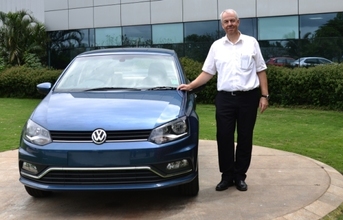
The VW Group has recently announced the setting up of its IT delivery and support centre in Pune, Volkswagen IT Services India with an investment of Euro 3 million. Dr. Lauermann calls it an important step and Volkswagen's contribution to ‘Make in India'.
"Having an independent IT center allows us at the plant to focus on making and selling cars. Of course, the IT center also supports us with its activities but it is global in nature as it is also catering to other Volkswagen markets globally. Having this centre in Pune makes sense because Pune is also an IT hub and there is immense talent available in the region," he shares.
Then we turn to the controversy that rocked Volkswagen globally, the emission issue. Obviously, like everywhere else, it also impacted the India operations. Dr. Lauermann told us how much. "As I mentioned earlier, we started pretty well in 2015 and we were doing quite good till this issue struck us in September. As a result sales started dropping as much as 30 percent.
"Thankfully, we were able to recover from it to some extent with the final number at three percent in terms of the loss. This year, of course, we are and will be doing much better. We are winning back the trust of the customers also," he says with certain confidence.
Then I ask him about another emission related issue - although entirely different from the earlier one - about the jump that the Indian Government is planning from Bharat Stage (BS) IV to Bharat Stage (BS) VI by 2020 by skipping one stage completely. He says that as a Company, Volkswagen is well-prepared for this change because it has the cars.
"Some people also ask us as to why are we downsizing our engines to BS IV. The reason is simple: because the fuel is not available. So the availability of BS VI fuel will also be a big challenge. We will need BS VI fuel at least one year before we bring in the cars but the problem with the oil companies is that they cannot bring the fuel so quickly. Well, all manufacturers are committed to the shift to BS VI and also to the timeline but under certain conditions.
"Of course, the discussion related to taxation in this context is still open therefore it will not be easy. We need a correct and reliable roadmap from the government in this regard that will assure us that we can invest because we need security to make investments," he says, adding that he is overall satisfied with the way the government is making efforts to bring reforms.
"There is a lot of movement and the biggest step is the GST. It is a step forward as now India is a common market. There will be a lot of trouble in the beginning for sure but this is a big step ahead in the right direction. The central Government is trying a lot to change the total circumstances for the industry in a positive way. They recognise that we need more growth. A GDP of 7 percent is nice but when you have to overcome the situation of poverty then you need more or less about 10 percent to 12 percent. And it is possible. Thankfully, we have also had a good monsoon this year so it will also help," he says.
(Continued on the next page)



























